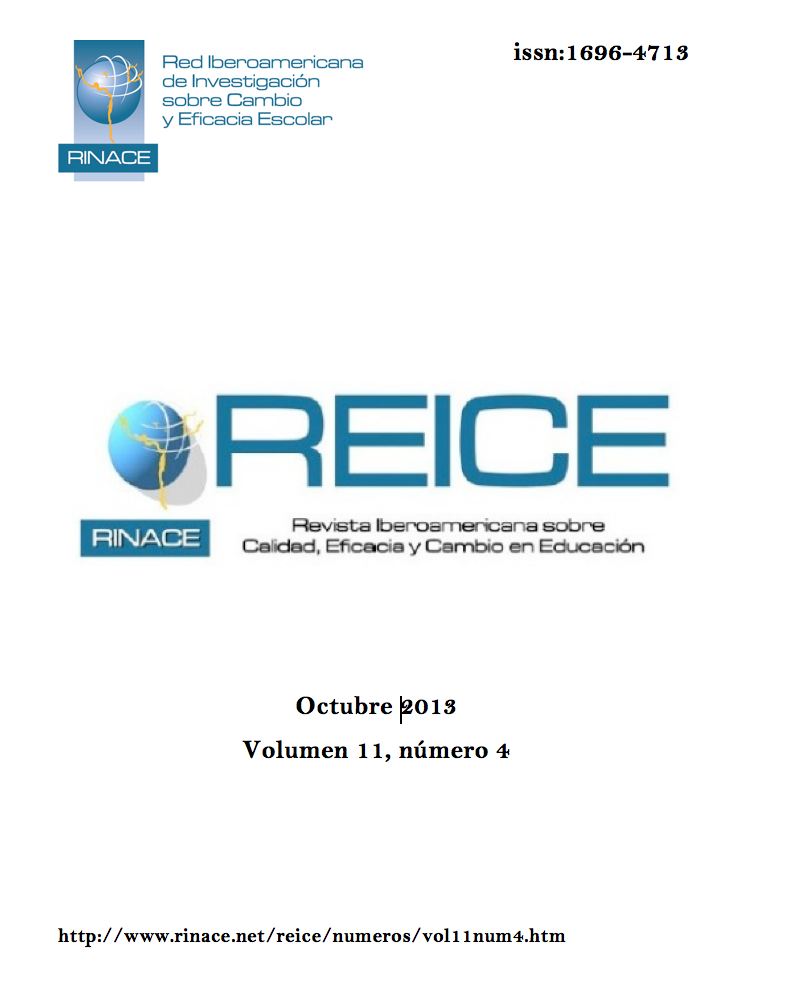Educative Factors that Influence on the Learning of Mathematical Contents at “Felix Varela Morales” Pedagogical University
Keywords:
Quality, Effectiveness, Change, Improvement, Equity, InnovationCopyright (c) 2016 REICE. Revista Iberoamericana sobre Calidad, Eficacia y Cambio en Educación

This work is licensed under a Creative Commons Attribution-NonCommercial-NoDerivatives 4.0 International License.
Abstract
The Iberoamerican Research on school efficacy offers a theory and a methodology to determine the educative factors associated with a quality education. In Cuba to be granted the university, the students should pass admission tests on Mathematics, Spanish Language and History of Cuba. Teachers from the Sciences Faculty at “Felix Varela Morales” Pedagogical University have developed a research on this topic to determine the educative factors that influence on the students’ difficulties in the learning of mathematical contents. There were identified the mathematical contents in which the students have the greatest difficulties. It was verified, that the variables related to the student (initial pedagogical professional orientation), to the class (teachers’ experience) and to the school institution (kind and size) are factors that influence on the success of the mathematical contents learning.
Downloads
References
Castellanos, D. et al (2001). Aprender y enseñar en la escuela. La Habana: Editorial Pueblo y Educación.
Chávez, J. (1991). La tradición pedagógica cubana. La Habana: Editorial Pueblo y Educación.
Laboratorio Latinoamericano de Calidad de la Educación- LLECE. (1998). Primer estudio internacional comparativo sobre lenguaje, matemática y factores asociados en tercero y cuarto grados. Primer informe. Santiago: UNESCO.
Laboratorio Latinoamericano de Calidad de la Educación- LLECE. (2000). Segundo informe del primer estudio internacional comparativo sobre lenguaje, matemática y factores asociados en tercer y cuarto grados de la educación básica. Santiago: UNESCO.
Laboratorio Latinoamericano de Calidad de la Educación- LLECE. (2001). Informe técnico. Primer estudio internacional comparativo sobre lenguaje, matemática y factores asociados en tercer y cuarto grados de la educación básica. Santiago: UNESCO.
Martínez, et al (2004). Reflexiones teórico-prácticas desde las ciencias de la educación. La Habana: Editorial Pueblo y Educación.
Murillo, F.J. (2003). La investigación sobre eficacia escolar en Iberoamérica. Revisión internacional del estado de la cuestión. Bogotá: Convenio Andrés Bello.
Murillo, F.J. (2006). Estudios sobre eficacia escolar en Iberoamérica. 15 buenas investigaciones. Bogotá: Convenio Andrés Bello.
Piñeros, L.J. (2004). Dimensiones del mejoramiento escolar. La escuela alza el vuelo. Bogotá: Convenio Andrés Bello.
Segundo Estudio Regional Comparativo y Explicativo (SERCE) (2009). Aportes para la enseñanza de la Matemática. Santiago: UNESCO.
Siegel S. (1970). Diseño experimental no paramétrico. La Habana: Instituto Cubano del Libro.
Soler, G. (2003). Aprendiendo el SPSS 8.0 para Windows: un material didáctico. La Habana: CENDA
Vigotsky, L.S. (1987). Historia del desarrollo de las funciones psíquicas superiores. La Habana:Editorial Científico-Técnica.
Vigotsky, L.S. (1998). Pensamiento y lenguaje. La Habana: Editorial Pueblo y Educación.
Wolff, L., Schiefelbein, E. y Valenzuela, J. (1993). Improving the quality of Primary Education in Latin America: Towards the 21st. century, Regional Studies Program Report 28. Washington, DC: The World Bank, LACTD.
